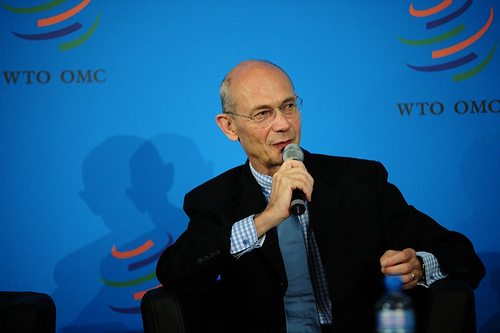The opening remarks made at the World Trade Organisation 4th Global Aid for Trade (AfT) Review this week all suggested a degree of consensus. According to nearly all, AfT has largely been a success, notwithstanding the recognised difficulties in carrying out evaluations. Speeches from Pascal Lamy (WTO), Angel Gurria (OECD) and representatives from a range of multilateral organisations (UNDP, AfDB, WB, IMF, ADB, IDB) all agreed on the need for AfT to address trade facilitation, trade finance, infrastructures, standards, value chains, upgrading, involving the private sector, inclusiveness, among others, with mentions of the need for ...
The OECD hosted the 2013 Policy Dialogue on Aid for Trade last week to discuss “how to continue delivering aid for trade results in a changing international environment for trade and development”. While this in part retread old ground, discussions nonetheless suggested that a change in thinking is taking place, particularly in terms of working with the private sector and helping developing country companies enter into global value chains. As my colleague Dan Lui discussed in a previous blog, the Aid for Trade agenda has faced a constant stream of questions, among others about definition ...
Trade ministers and officials from South and North, academics, and donors will gather at the OECD in Paris next week for a policy dialogue to discuss the future of the Aid for Trade initiative. Conceived in 2005 in the context of the WTO Doha Round, Aid for Trade aims to improve the trading prospects of developing countries through targeting aid to this sector. In the seven years since its launch, there has already been a fair amount of navel-gazing amongst policymakers on questions of how to ‘operationalise’ such a broad and ambitious agenda. In the ...
“Jobs” are the focus of the recently launched World Development Report 2013. This year’s edition of the World Bank’s annual flagship publication raises a host of interesting issues. Key points and take away messages I got from the London launch event earlier this month are: 1) Although labour market functioning is important, labour market policies in developing countries matter much less for employment than other policies because of implementation difficulties and the fact that most employment is informal. 2) Relatedly, although most people in developing countries are informally self-employed on farms and in micro-enterprises, it ...
Despite being hit by the current economic and financial crisis, Europe remains a strong advocate and keen supporter of deep regional integration, at home and abroad. In Africa, the arguments for fostering integration are manifold; from building larger markets that can attract Foreign Direct Investments, achieving economies of scale, enhancing competitiveness, to fundamental security considerations. Today there are a host of ambitious integration arrangements among African states, many of them overlapping in space and scope. However the track record is quite disappointing for a variety of reasons. What could the EU do to improve this ...
++ GUEST CONTRIBUTION ++ Forthcoming in Trade Negotiations Insights Vol. 10, N0.8, November 2011 On 30 September 2011 the European Commission issued a proposal to withdraw 18 ACP countries from the list of beneficiaries of preferences under Regulation 1528/2007 as of 1 January 2014.[1] This proposal is based on a provision in the Regulation permitting withdrawal of any ACP country that does not ratify an interim or full EPA within a ‘reasonable period of time’ such that the entry into force of the agreement is ‘unreasonably delayed’. There are various problems with the Commission’s proposal. ...
The European Parliament held its first hearing on the European Commission’s proposal for the European Union’s new GSP scheme at the end of May. The new proposal is far-reaching and ambitious (see Isabelle Ramdoo’s overview of the main changes). The hearing comprised of several interventions by experts, business representatives and officials, followed by a Q&A session. The two hours long hearing touched upon many of the proposal’s features, but comments and discussions focused on the big lines. The GSP debate is well under way, and the EC’s proposal is raising key questions about EU trade ...
On 10 May, the European Commission (EC) put forward its proposal for a new European Union (EU) regulation applying a scheme of generalised tariff preferences (GSP) and will hold a public consultation on this and Economic Partnership Agreements next week. In this proposal, the EU grants trade benefits through the GSP to developing countries in the form of reduced or zero customs tariffs on imports of goods. The EC proposes that the new system concentrate its import preferences on those developing countries “most in need”. ECDPM is preparing a full analysis of the proposal, but ...
Key donors and international experts attending the 28-29 March OECD workshop on implementation of the Aid for Trade Initiative discussed how developing countries can undertake the reforms necessary to improve their supply-side capacity and trade-related infrastructure in order to benefit from international trade opportunities and achieve economic growth. Participants also discussed how to evaluate the impact of AfT on trade. The background documents and presentations are posted on the workshop’s website. According to a report from ICTSD, participants agreed that AfT efforts have in general been successful, but that further policy coordination is needed, not ...
ECDPM and partners organized on 4 October an informal meeting of like minded-donors to further the dialogue on how to improve cross-sectoral cooperation within as well as across donor agencies on Aid for Trade (AfT) and Agriculture and Rural Development (ARD). A consensus seemed to emerge that donors should play a complementary role and be guided by partner countries in what actions they should take to make trade and agriculture policies more coherent and ARD-AfT better linked and more effective. In general there is a feeling that trade should be seen more as a policy ...


















